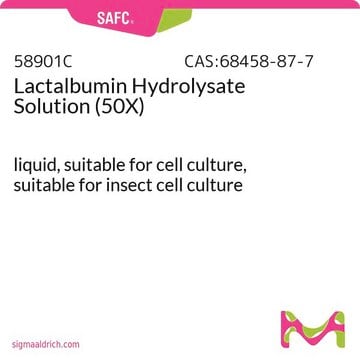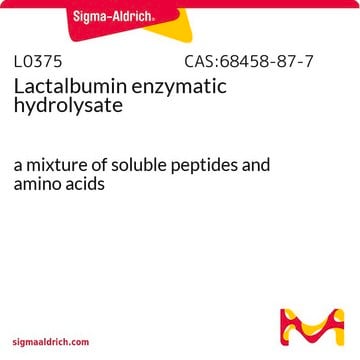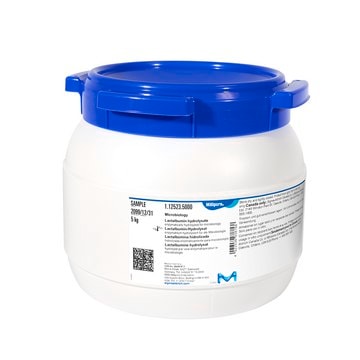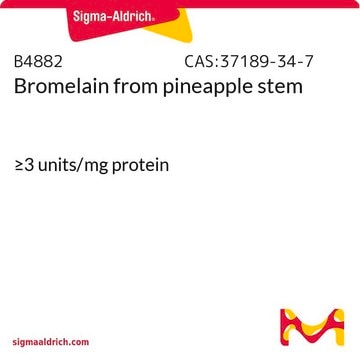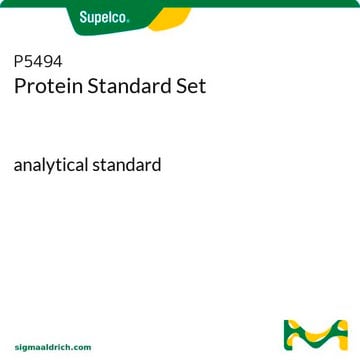L9010
Lactalbumin enzymatic hydrolysate
powder, BioReagent, suitable for cell culture
Sign Into View Organizational & Contract Pricing
All Photos(2)
About This Item
Recommended Products
biological source
Porcine
bovine milk
Quality Level
product line
BioReagent
form
powder
nitrogen analysis
≥11.0% total
technique(s)
cell culture | mammalian: suitable
storage temp.
2-8°C
Looking for similar products? Visit Product Comparison Guide
Application
Lactalbumin enzymatic hydrolysate has been used: in the preparation of modified Caenorhabditis elegans habitation and reproduction medium (mCeHR), as a component in Dulbecco′s modified Eagle medium (DMEM) for matrix metalloproteinase-13 (MMP-13) preparation, as a supplement in 6M medium to cultivate baby hamster kidney fibroblasts (BHK 21/13) cells for a comparative study
Biochem/physiol Actions
Lactalbumin enzymatic hydrolysate can be used as an amino acid or peptide-rich supplement in several mammalian and microbial cell culture applications.
Storage Class Code
11 - Combustible Solids
WGK
WGK 1
Flash Point(F)
Not applicable
Flash Point(C)
Not applicable
Personal Protective Equipment
dust mask type N95 (US), Eyeshields, Gloves
Certificates of Analysis (COA)
Search for Certificates of Analysis (COA) by entering the products Lot/Batch Number. Lot and Batch Numbers can be found on a product’s label following the words ‘Lot’ or ‘Batch’.
Already Own This Product?
Find documentation for the products that you have recently purchased in the Document Library.
Customers Also Viewed
S I Gürhan et al.
Cytotechnology, 3(1), 89-93 (1990-01-01)
Suspended BHK 21/13 cells were cultivated in 6M medium supplemented with PVP, bovine serum, LAH, YE, choline chloride and inositol at several concentrations. The maximum working capacity of the bioreactors was 400 ml and the experiments were run for 40
Tamika K Samuel et al.
Journal of visualized experiments : JoVE, (90), e51796-e51796 (2014-08-26)
In this protocol, we present the required materials, and the procedure for making modified C. elegans Habituation and Reproduction media (mCeHR). Additionally, the steps for exposing and acclimatizing C. elegans grown on E. coli to axenic liquid media are described.
Inna Solomonov et al.
Proceedings of the National Academy of Sciences of the United States of America, 113(39), 10884-10889 (2016-09-16)
It is well established that the expression profiles of multiple and possibly redundant matrix-remodeling proteases (e.g., collagenases) differ strongly in health, disease, and development. Although enzymatic redundancy might be inferred from their close similarity in structure, their in vivo activity
Our team of scientists has experience in all areas of research including Life Science, Material Science, Chemical Synthesis, Chromatography, Analytical and many others.
Contact Technical Service